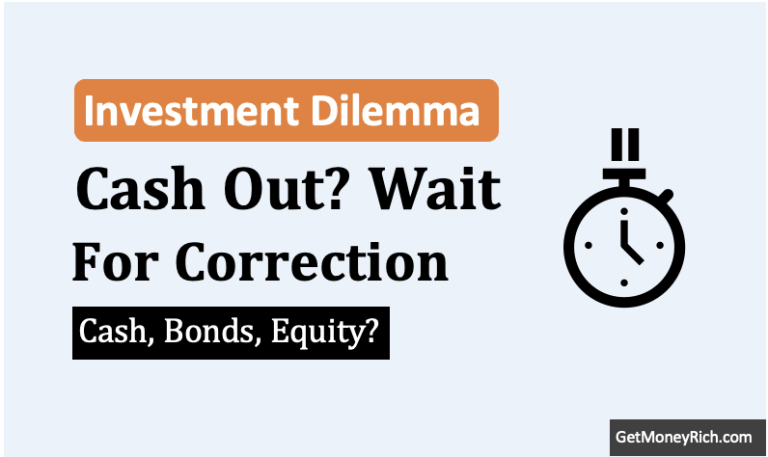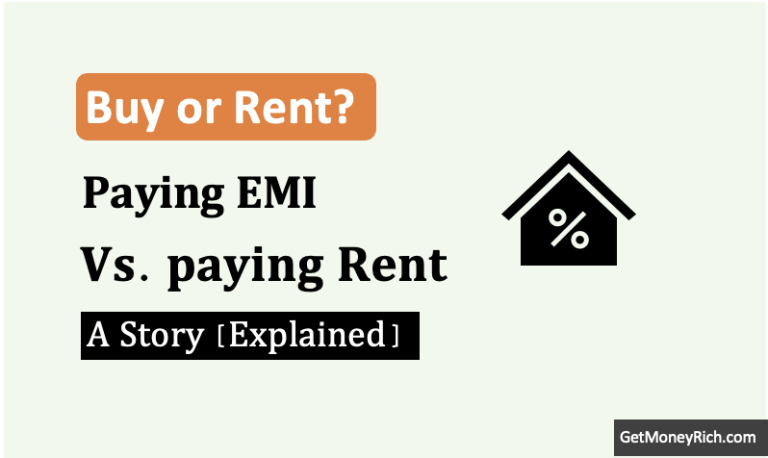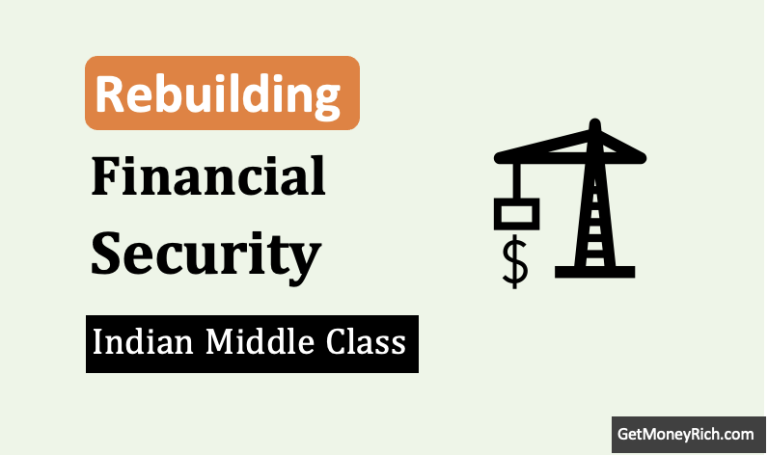Summary:
- Let’s explores why some wealthy Indians, like a Mumbai millionaire who rents a luxurious Churchgate apartment despite a Rs.50 crore net worth, choose renting over buying to preserve wealth, prioritize lifestyle, and maintain financial flexibility.
Home Affordability Calculator
Introduction
Like me, you too have probably grown up hearing that owning a home is the ultimate sign of success & security. In India, buying a house is almost like a ritual. It’s what our parents dreamed of, and it’s what many of us aim for.
But recently, I came across a story that made me rethink this idea (check this video).
A man with a net worth of over Rs. 50 crore chooses to rent a luxurious apartment in Mumbai’s Churchgate instead of buying one. Yes, you read that right, Rs. 50 crore, and he’s still a tenant.
This got me thinking and very curious.
Why would someone with so much wealth rent instead of buy? And is this a one-off case, or are more Indians thinking this way?
By the way, I’m personally from that group who would rather buy a home in 20s than live on rent. Old School.
Let’s dive into this matter of even high net worth people choosing to live on rent.
The Traditional Indian Dream of Owning a Home
In India, owning a home is more than just a financial decision. It’s emotional. It’s cultural.
Growing up, I remember my neighbour uncle saving every penny to buy a small flat in Delhi.
He used to say, “A house is your security. Renting is like throwing money away.”
Most Indians share this view. A survey found that 88% of urban Indians aspire to own a home. For many, it’s about stability, status, and leaving something for the next generation.
But owning a home isn’t cheap, especially in cities like Mumbai, Delhi, Bangalore, or even Pune. A decent 2BHK in a good Mumbai locality can easily cost Rs. 2-5 crore.
For the average salaried person, this means years of saving or a hefty home loan. Even then, EMIs can eat up half your income.
So, naturally, we assume people who rent are those who can’t afford to buy. They’re either young professionals, or maybe they’re in jobs that require frequent moves.
But what about someone who can afford to buy, someone with crores in the bank, and still chooses to rent?
That’s where things get interesting.
A New Kind of Renter – The Wealthy Tenant
Let’s go back to our man in the video.
His name is Gajendra, a wealth manager living in a spacious 3BHK in Churchgate, one of Mumbai’s poshest areas. His apartment is 1,800 square feet, with a stunning balcony and natural light flooding every room.
The rent? What a majority of us cannot imagine to pay, Rs. 3 lakh per month.
For many in India, that’s more than a year’s salary.
Yet, Gajendra isn’t struggling to pay it. With a net worth of over Rs. 50 crore, he could buy a house, or several. So why rent?
What’s Gajendra Rational
Gajendra’s reasoning is simple but powerful.
He wants to live in a prime location now. Churchgate is close to his office, his kids’ school, and the railway station. He walks to work in eight minutes. He eats home-cooked meals with his family every day.
For him, this is true luxury, not owning a house, but living a life that saves time and maximizes comfort.
Alternatively, buying a home in Churchgate would cost Rs. 10-12 crore. That’s a lot of money but he can afford it considering his net worth of Rs.50 crore.
But he has another reason for not buying the house now.
He’d need three flats (one for himself and two for his brothers). That’s nearly his entire net worth gone in one go. Instead, he invests his money in financial assets, expecting them to double in 5-6 years at 12-15% returns.
Renting lets him keep his wealth growing while enjoying a dream lifestyle.
Why Renting Makes Sense for the Wealthy
Gajendra’s story isn’t unique.
More high-net-worth individuals (HNIs) in India are choosing to rent, especially in metro cities.
A 2024 report by Knight Frank India noted that luxury rental demand in Mumbai and Delhi grew by 15% in the past two years.
These aren’t people who can’t afford to buy. They’re entrepreneurs, professionals, and investors with crores in assets. So what’s driving this trend?
- For one, real estate in prime locations is insanely expensive. A sea-facing flat in Mumbai’s Nariman Point or Delhi’s Lutyens’ Zone can cost Rs. 20-50 crore. Even for someone with Rs. 10 crore in savings, buying such a property means liquidating most of their portfolio. That’s a big risk. What if the stock market or mutual funds could give them 12% returns annually? That’s Rs. 1.2 crore a year without touching the principal. Renting lets them keep their money working while living in a home that matches their status.
- Then there’s flexibility. Cities like Mumbai are dynamic. Business hubs shift. In the last decade, we have seen Lower Parel or BKC replacing South Mumbai for many companies. Renting allows wealthy individuals to move closer to new opportunities without being tied to a property.
Gajendra himself dreams of upgrading to an NCPA apartment with a sea view. Renting makes that possible without the hassle of selling a house.
The Power of Compounding Wealth
Let’s discuss the numbers because that’s what keeps most HNIs glued to their investment portfolios (delayinng the house purchase).
Imagine you have Rs. 5 crore in investments. If you buy a house in a prime area in Bangalore, you might have to spend it all. Your wealth is now tied to that property. Sure, the real estate will also appreciate in value, say, at about 7% per year in, according to a 2022 Colliers India report.
But what if you rented instead and invested that Rs. 5 crore in a diversified portfolio?
At 12% annual returns, achievable through equity mutual funds or stocks, your money could grow from Rs.5 Crore to Rs.10 crore in six years. Meanwhile, you’re paying about Rs.50,000 a month in rent, which is a small fraction of your income if you’re wealthy.
This is exactly what Gajendra is doing.
His Rs. 50 crore is invested, not locked in real estate. He expects it to double to Rs. 100 crore in a few years. If he buys three flats now, he’s back to zero. He’ll have to start his wealth-building journey from scratch.
Ask any investor, and none of them would like to start their wealth-building journey again. Not that it is too tough, but the daily-lure of watching the portfolio becoming bigger everyday is too tempting.
Such people have a very strong feeling that by renting, he’s betting on future financial freedom. It’s a calculated move, not a compromise.
Is Renting Really “Throwing Money Away”?
Now, I know what you’re thinking.
Renting feels like paying someone else’s mortgage. Every month, Rs. 3 lakh leaves Gajendra’s bank account, and he has no asset to show for it.
My mom would probably say, “Why waste money when you can own?”
This is a valid concern. In India, homeownership is tied to security. A house is something you can pass on to your kids. It’s a safety net if things go wrong. But Gajendra sees it differently.
First, for people like Gajendra, they have a safety net of Rs.50 crore investment corpus. Even if “something goes wrong“, say a job loss, they have a huge safety net. They are not like other common people who are in desperate need of an emergency back-up like a home .
Moreover, for Gajendra, the real waste is missing out on life today. He talks about his daughter, who loves her colorful bedroom and paints while listening to birds from the balcony. His son enjoys a simple room with his Mac and chessboard. Gajendra himself walks to work, avoids Mumbai’s brutal traffic, and spends quality time with his family. This lifestyle is his priority, not owning a house.
He even says Mumbai’s culture doesn’t judge renters. His neighbors don’t care if he owns or rents, they’re too busy living their own lives.
Still, I wonder, does this mindset work for everyone? What happens when you’re older, and the idea of paying rent feels less appealing?
Let’s explore that next as well.
The Retirement Question – Will Renters Eventually Buy?
Most Indians, even wealthy ones, want to own a home before retirement.
A survey found that 65% of urban Indians see homeownership as a key retirement goal. Why? Renting in old age can be tricky. Rents rise with inflation, often 5-10% annually in cities like Mumbai. A Rs. 3 lakh monthly rent today could be Rs. 5 lakh in 10 years. Plus, landlords can be unpredictable. What if they ask you to vacate? For retirees on a fixed income, these risks feel daunting.
Gajendra doesn’t talk much about retirement, but he hints at flexibility. He says he’s not keen on buying in Mumbai, where prices are sky-high. Instead, he’s focused on growing his wealth.
I’m assuming that, by the time he’s 60, his Rs. 50 crore could be at least Rs. 200-300 crore. At that point, he could buy a luxurious home without blinking. But what if his dream home, an NCPA flat, say costs Rs.100 crore by then?
Will he still delay buying, chasing an even bigger portfolio? It’s a gamble.
I think most renters, even wealthy ones, will buy eventually. Owning a home brings peace of mind, especially when you’re older. But for someone like Gajendra, with crores in the bank, renting might work indefinitely.
His wealth gives him that option. He could rent forever, buy later, or even move to a cheaper city.
The question is, how many Indians have that kind of financial cushion?
The Mumbai Factor
Mumbai plays a big role in this story.
It’s not just any city, it’s India’s financial capital, where real estate is a different beast.
A 2023 Anarock report says Mumbai’s average property price is Rs. 15,000-20,000 per square foot in prime areas. A 1,000-square-foot flat costs about Rs.2 crore, and that’s not even in Churchgate or Nariman Point. For ultra-luxury homes, prices hit Rs.50,000 per square foot.
No wonder even millionaires think twice before buying.
Mumbai’s culture also supports renting. Unlike smaller cities, where owning a house is a status symbol, Mumbai is more practical. Like Gajendra says, his neighbors don’t care if he rents.
The city’s fast-paced life means people value convenience over judgment. Plus, Mumbai’s connectivity, trains, coastal roads, upcoming metro lines, makes prime locations like Churchgate incredibly appealing for renters.
You can walk to work, avoid traffic, and live near top schools and clubs.
In other cities, this level of convenience is harder to find.
Is Renting the Future for Wealthy Indians?
So, what’s the big lesson here?
For me, Gajendra’s story shows that wealth isn’t just about owning things, it’s about choices. Renting lets him live in a dream home, save time, and grow his wealth. It’s a strategy that works because he’s disciplined, financially savvy, and in a city that supports his lifestyle.
But I can’t help wondering, is this sustainable for everyone? What happens when life slows down, and the idea of a “forever home” feels more important? Hence, I believe that renting makes sense only for a small but growing group of wealthy Indians.
If you have a solid investment portfolio and live in a city like Mumbai, renting can be a smart move. It frees up your money to grow, gives you flexibility, and lets you enjoy a premium lifestyle.
But for most of us, the emotional pull of owning a home is strong. I’d bet that even Gajendra might buy one day, maybe not in Mumbai, but somewhere that feels like home.
What do you think, Would you rent a luxurious flat to keep your wealth growing? No doubt, it is an interesting thought. But this idea can also be risky if normal Indian’s begin to follow the ideas of Gajenndra.
If you want to think and act like gajendra, you must have a portfolio as big as him first.
Please share with me your thoughts of this new culture of rich Indian’s staying on rent for the sake of keeping their large investment portfolio intact.
[Note: You can use the above home affordability calculator to check if you can afford to buy your dream house]
Have a happy investing.






